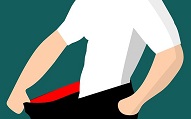Can Urinary Tract Infection Cause Lower Back Pain?
Date:2019-10-25 click:0
Urinary tract infections can cause lower back pain, but not all of the urinary tract infections. Generally, the urinary tract is divided into the upper urinary tract and the lower urinary tract. The lower urinary tract includes the urethra, prostate, and bladder. The upper urinary tract includes both kidneys and ureters.

Typically, lower urinary tract infection will not cause back pain, but only lower urinary tract irritation symptoms, i.e., frequent urination, urgent urination, the pain of urination, and hematuria with naked eyes, patients with the severe condition may have a fever without back pain.
If the infection invades the upper urinary tract, such as the presence of high-pressure factors in the bladder, resulting in bacterial urine flowing back into the kidney along the ureter, then lower back pain will occur, such as pyelonephritis, which belongs to the upper urinary tract infection.
In addition to the symptoms of urinary tract stimulation, patients can also have low back pain on the infected side, especially when they tap their hands on the waist. At this time, routine urine examination, in addition to bacterial infection, the urine routine cell tube type, can be seen. If tube type accompanied by low back pain occurs, upper urinary tract infection can be confirmed.

In addition to lower back pain, it may also lead to fever, fatigue, nausea and vomiting, and other systemic clinical symptoms. Urinary tract infection, in this case, is generally called acute pyelonephritis. After the diagnosis of urinary tract infection, wide-spectrum antibiotic therapy is often used.
For severe urinary tract infection, it needs to be treated by intravenous injection of broad-spectrum anti-inflammatory drugs, such as cephalosporins or quinolones. The commonly used drugs are ceftizoxime sodium, raoxifen, cefoxitin, levofloxacin, moxifloxacin, etc. after the symptoms improved, they can be treated by anti-inflammatory drugs orally.
However, due to the emphasis on the continuous use of drugs, though antibiotics can achieve a quick effect, long-term use will lead to drug resistance, side effects, gastrointestinal damage, resulting in repeated episodes of urethritis. Due to the low immunity of the patients themselves, the traditional Chinese herbal medicine Diuretic and Anti-inflammatory Pill can be selected in combination with antibiotics.

It will not produce drug resistance and toxic side effects, and it is safe to take in the long term, which is more suitable for chronic prostatitis. Moreover, it has the functions of clearing away heat and detoxification, promoting blood circulation and Qi to relieve pain, promoting diuresis and relieving stranguria.
Therefore, it can not only effectively treat prostatitis and urinary tract infection, but also help patients improve the internal environment of the urogenital system, improve immunity, so as to achieve the effect of removing disease and preventing a recurrence.
To prevent urinary tract infection, we should make not only use of the defense mechanism of the body but also avoid the susceptible factors. Patients should drink a lot of water every day and urinate once every 2-3 hours, which can reduce the incidence of urinary tract infection. Drinking tea also has a certain preventive effect.

Moreover, active treatment of chronic colitis, chronic gynecological diseases, diabetes, chronic kidney disease, hypertension, and other diseases prone to urinary tract infection is an important measure to prevent a recurrence, too.



